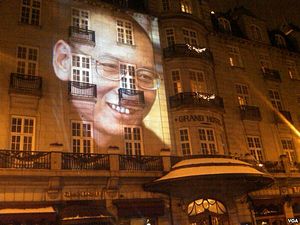When the famous Chinese dissident Liu Xiaobo died from liver cancer on July 13, China earned the unwelcome distinction of becoming the first state since Nazi Germany to have a Nobel Prize winner die while imprisoned for dissent. This sad event serves as a reminder of the ongoing difficulty that Chinese leaders have faced in their efforts to earn China the international esteem and soft power to match its impressive economic growth and military capabilities.
If soft power is understood as the ability to get other people and governments to want what you want without having to compel their cooperation, China still seems to be punching far below its weight. Despite extensive investment in cultural promotion, educational exchange, and foreign-language media offerings, Chinese soft power initiatives do not seem to have had a major impact on global public opinion toward China. It is telling that despite considerable engagement in Africa, Chinese leaders failed to pressure even the small nation of Botswana to refrain from hosting a visit by the Dalai Lama — a common sticking point for Chinese officials. Closer to home, China’s aggressive military posture and forceful approach to diplomacy have undermined the trust and goodwill of neighboring countries in Southeast Asia.
Joseph Nye, who coined the idea of soft power, has proposed three sources of a country’s soft power, including “its culture (in places that find it appealing), its political values (when it lives up to them at home and abroad), and its foreign policies (when they are seen as legitimate and having moral authority)” and he suggests that China’s problem boils down to a focus on the first of these and a neglect of the other two. Nye points to ongoing controversies, such as questions about limits to academic freedom in Chinese government-funded Confucius Institutes, as evidence that the Chinese government’s top-down approach to building soft power has undermined the chance for civil society to fuel it more organically. Meanwhile, the Chinese government continues to rely on overt censorship and propaganda to control coverage of continuing corruption and international concerns over its behavior abroad. These failing efforts only underline the problem.
The fact that India seems to be outperforming China in the soft power game with much less state control or direction suggests that there is some truth to Nye’s criticism of China. If governments and government leaders hope to grip the imaginations of people abroad, they must be proactive by providing an attractive model of governance and preserving space for their citizens to provide compelling cultural contributions at a grassroots level. These are things that state-backed propaganda rarely accomplishes.
One of the ironies of China’s soft power deficiency is that Chinese leaders have heavily invested in establishing state-backed Confucius Institutes abroad, but Confucius himself would have urged them to focus their attention inward. Confucius emphasized the role of moral power and example, nicely stated in his suggestion that “He who rules by virtue is like the polestar, which remains unmoving in its mansion while all the other stars revolve respectfully around it.” Mencius, another early thinker who built on the ideas of Confucius, coupled the importance of the moral example of leaders with the importance of policies that promoted prosperity and avoided stifling the productivity and moral cultivation of citizens with heavy-handed interference. According to these and other classical Chinese thinkers, it is by moral example and practical attention to the needs of the common people, pursued through sincere and open debate, that a state becomes attractive and strong. They distrusted approaches that leaned on censorship, intolerance, and propaganda.
These ideas are hardly lost on Chinese thinkers today. One prominent example is Yan Xuetong, a Chinese foreign policy analyst who is usually considered an aggressive realist. Even while pushing for more assertive foreign policy positions, he highlights classical Chinese thinkers’ emphasis on the attractive and persuasive power of moral authority from benevolent governance as a key tool to maximize Chinese power today. The importance of combating corruption, ensuring fairness, and prioritizing moral persuasion over coercion in domestic affairs was recognized as central across China’s history—and these issues remain challenging for the country today. Much like economic and military power, soft power must start from within and no shortcuts can replace the fundamentals.
If current Chinese leaders want to build successful soft power to secure Chinese interests on the global stage, they should consult the wisdom of their culture’s earliest thinkers. Doing so does not suggest that there is one most appropriate specific government system that they should adopt, but it does mean that more serious reform of governance in general is crucial. At a minimum, efforts to root out corruption must be reinforced and made more impartial to restore the moral credibility of the leadership, while greater freedom of expression to engage in cultural production and moral debate will give the Chinese people a better chance to throw their own weight into boosting China’s soft power.
Ultimately, a China with the confidence, credibility, and openness to accept the critical voice of a Liu Xiaobo at home will be a China with the cultural and moral power to persuade and influence others abroad.
Robert C. Thomas is an Asia-Pacific Fellow with Young Professionals in Foreign Policy (YPFP). He is also a government security contractor and the Managing Editor of Parabellum Report.

































